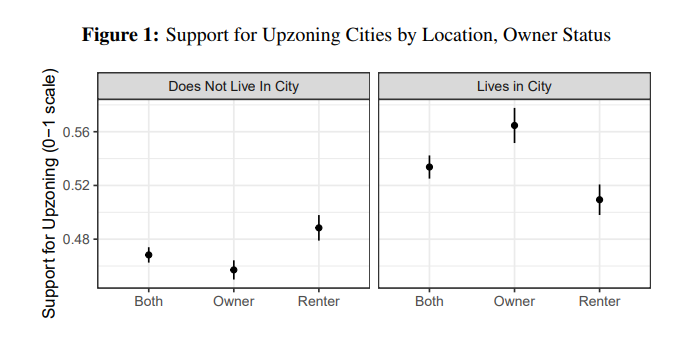Some people like cities, some don't
Broockman Elmendorf and Kalla on opposition to housing
The Truth About NIMBYs: The political psychology of opposition to new housing. Jerusalem Demsas interview with David Broockman, Atlantic, January 2025. They’re discussing a recent paper: The Symbolic Politics of Housing, by Broockman, Chris Elmendorf, and Joshua Kalla.
Why do people oppose new housing?
A common belief among politicians is that it’s mostly homeowners who don’t want to see their property values go down. This is William Fischel’s homevoter hypothesis.
For quite a while, I’ve thought that it’s mostly small-c conservatism: people like their neighbourhood the way it is, that’s why they live there. They want to minimize change to their neighbourhood.
David Broockman provides another possible explanation, one which explains both why people oppose housing, but also why other people support it: variation in people’s preferences or tastes. Some people like big cities, and other people don’t.
One of those personal anecdotes: I was talking with a member of my family—as I mentioned, I have a condo in San Francisco, where I live—and this member of my family and I were talking about moving to this condo and how I wish there was more housing like this. I was talking to them about it, and they just said, You know, I just don’t understand how you can live like that. You know, You don’t have a yard. You know, you can’t walk out onto green grass right from your front door. And they, eventually, at some point said not just, I don’t think you should live like that, but they said, People shouldn’t live like that.
And I realized, Well, wait a minute. To some extent, you know, the people who choose to go live in the suburbs, they obviously have revealed through that choice, to the extent they can—on average, the people who choose to live in the suburbs are revealing that’s the kind of low-density living that they like. Whereas me, choosing to live in a condo in San Francisco, I’m revealing I have a taste for this like high-density living—where for me, living in the suburbs is like my version of a nightmare.
So I realized in that conversation, Okay, people clearly have these tastes, but they’re kind of externalizing those into their views about public policy and thinking, Okay, it’s not just that I think, for example, cities good. Like, as someone like me who loves living in a dense city, it seems that then affects my preferences about what public policy should allow. Just like people who live in suburbs, they’re thinking, Hmm, like, that’s not the kind of living I want. That’s not what the government should be encouraging.
It’s a bit like a Rorschach test. If you look at this six-storey apartment building on Fraser near King Edward, is it good or bad?
How about this 40-storey high-rise at Broadway and Granville, on top of a new SkyTrain station?
Cities aren’t for everyone, of course - some people would prefer to live further out and have more space. But there's plenty of people who want to live close to work, trading space for time. Then they can get around by taking transit, walking, or biking, instead of living further out and spending more time driving to and from work, fighting traffic.
More
Matthew Yglesias: In praise of courtyard apartments



